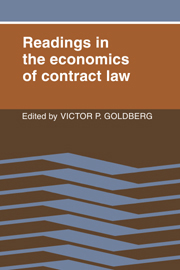Book contents
- Frontmatter
- Contents
- Preface
- Readings in the economics of contract law
- Part I Some preliminaries
- Part II Contract law and the least cost avoider
- Part III The expectation interest, the reliance interest, and consequential damages
- Part IV The lost-volume seller puzzle
- Part V Specific performance and the cost of completion
- 5.1 The choice of remedy for breach of contract
- 5.2 Relational exchange, contract law, and the Boomer problem (2)
- 5.3 Cost of completion or diminution in market value: the relevance of subjective value
- Questions and notes on specific performance and cost of completion
- Part VI Power, governance, and the penalty clause puzzle
- Part VII Standard forms and warranties
- Part VIII Duress, preexisting duty, and good faith modification
- Part IX Impossibility, related doctrines, and price adjustment
- Questions and notes on impossibility and price adjustment
- References
- Index of cases
- Author index
- Subject index
Questions and notes on specific performance and cost of completion
Published online by Cambridge University Press: 10 November 2010
- Frontmatter
- Contents
- Preface
- Readings in the economics of contract law
- Part I Some preliminaries
- Part II Contract law and the least cost avoider
- Part III The expectation interest, the reliance interest, and consequential damages
- Part IV The lost-volume seller puzzle
- Part V Specific performance and the cost of completion
- 5.1 The choice of remedy for breach of contract
- 5.2 Relational exchange, contract law, and the Boomer problem (2)
- 5.3 Cost of completion or diminution in market value: the relevance of subjective value
- Questions and notes on specific performance and cost of completion
- Part VI Power, governance, and the penalty clause puzzle
- Part VII Standard forms and warranties
- Part VIII Duress, preexisting duty, and good faith modification
- Part IX Impossibility, related doctrines, and price adjustment
- Questions and notes on impossibility and price adjustment
- References
- Index of cases
- Author index
- Subject index
Summary
Suppose Smith enters into a contract selling a unique antique chair to Brown for $500. Along comes Jones who was totally unaware of the contract with Brown. Jones offers Smith $800. Note that this is a case in which the subject matter of the contract is unique and the contract is one “to give,” both of these being conditions that most commentators say favor granting of specific performance.
1.1. Should Brown be granted an injunction?
1.2. If Jones gave Smith the $800 and took the chair home with him, should Brown be granted specific performance? What would that entail? Would it require voiding the Jones-Smith transaction? Or would Smith have to buy back the chair from Jones?
1.3. If he were denied specific performance, what would Brown's damage remedy be? How would the market price be measured?
1.4. If specific performance is infeasible after Jones has taken possession, the only circumstances in which the remedy would be feasible would be when Brown learned of a not-yet-executed substitute contract that he could then enjoin. Notice that Brown could have easily gotten a stronger remedy than specific performance by taking title instead of simply entering into a contract.
[…]
- Type
- Chapter
- Information
- Readings in the Economics of Contract Law , pp. 133 - 136Publisher: Cambridge University PressPrint publication year: 1982

